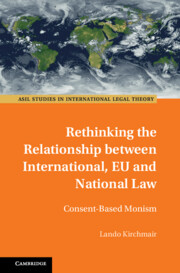Book contents
- Rethinking the Relationship between International, EU and National Law
- ASIL Studies in International Legal Theory
- Rethinking the Relationship between International, EU and National Law
- Copyright page
- Contents
- Figures and Tables
- Preface
- Acknowledgments
- Table of Cases
- Abbreviations
- Introduction
- Part I Common Theories on the Relationship of Legal Orders and Their Flaws Concerning the EU Legal Order
- Part II Consent-Based Monism
- Part III A Practical Application of Consent-Based Monism
- Conclusion
- Bibliography
- Index
Introduction
Setting the Stage
Published online by Cambridge University Press: 29 February 2024
- Rethinking the Relationship between International, EU and National Law
- ASIL Studies in International Legal Theory
- Rethinking the Relationship between International, EU and National Law
- Copyright page
- Contents
- Figures and Tables
- Preface
- Acknowledgments
- Table of Cases
- Abbreviations
- Introduction
- Part I Common Theories on the Relationship of Legal Orders and Their Flaws Concerning the EU Legal Order
- Part II Consent-Based Monism
- Part III A Practical Application of Consent-Based Monism
- Conclusion
- Bibliography
- Index
Summary
The relationship between international and national law has been debated for centuries. Generally, the floor has been divided between two approaches: dualism and monism, mostly as advocated by Hans Kelsen. I argue that, in the light of major developments since their inception, such as the establishment of the European Union (EU), these theories can no longer comprehensively explain the relationship between international, EU and national law. While dualism as developed by Heinrich Triepel liberated the international legal order from an overly dominant national perspective some 125 years ago, it is not well equipped to accommodate the massive overlaps between international, EU and Member State legal orders today. In Hans Kelsen’s version, monism is an epistemological theory about what the law might be. It does not provide satisfactory guidance for the doctrinal solution of norm conflicts between international, EU and Member State law. Thus, a key focus of this book is to reconceptualize the theoretical relationship between legal orders. Even though some scholars have doubted the relevance of theoretical inquiries such as dualistic or monistic analyses of the relationship between legal orders, I cannot agree with those who trivialize this theoretical discussion by saying it would be “unreal, artificial and strictly beside the point.”1 If we continue reading Fitzmaurice’s view, it becomes clear that this is simply a dualistic argument. Yet current developments, fundamental changes and new phenomena such as the massive increase in international institutions, actors, norms and tribunals as well as adjudicators make it imperative to seek new theoretical concepts. The so-called globalization of law2 as framed in the famous constitutionalization of international law3 may be mentioned, among other developments, to elucidate the ever-growing importance of the debate on whether international, EU or national law has the final say.4
- Type
- Chapter
- Information
- Rethinking the Relationship between International, EU and National LawConsent-Based Monism, pp. 1 - 6Publisher: Cambridge University PressPrint publication year: 2024

